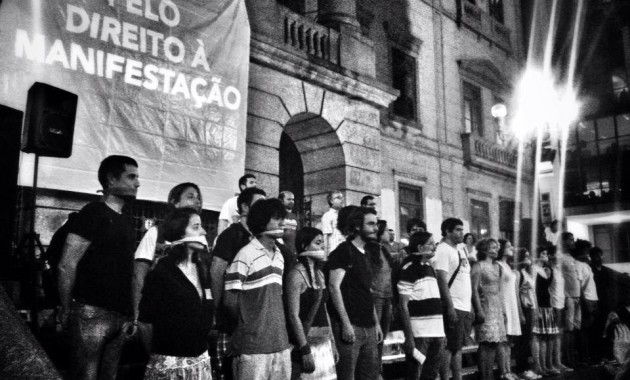Facing the Past and Present: an account on Brazil’s protests

The violent repression of public protest and the torture and subsequent murder of a missing man signals the legacy of the dictatorship remains in Brazil writes Renata Meirelles*
Since June many protests have taken place in Brazil. For the first time in the country’s history thousands of people from different backgrounds – the middle class, people from the elites and from the working class – have marched together demanding improvements in public transport, education and the health system. Although over the past ten years Brazil has experienced some improvements in areas such as poverty reduction, the promised changes to the country’s infrastructure,, as part of preparations for next year’s World Cup and the 2016 Olympics, have not taken place. On 14th July 2013 a resident of the Rio de Janeiro’s largest favela, a man called Amarildo, went missing after being tortured under interrogation by policemen belonging to a police unit known as UPP (“Unit for the Peace-building Police”). The pacification programme is one of the city’s efforts to improve public security and to drive out drug-trafficking gangs from the city’s residential areas before the World Cup and the Olympics. Pressure from civil society forced the authorities to respond to the state abuses inflicted on Amarildo and ten policemen in Rio de Janeiro have been charged with his torture and murder. Amarildo’s case, and the response of civil society to it, have demonstrated that killings by the police forces will not be tolerated in a country that claims to be a democracy. Since his disappearance “Where is Amarildo?” has become a popular slogan on placards in Rio’s protests. More recently in Rio de Janeiro, dissatisfaction with the state’s government and its new proposed education policy has brought thousands to the streets again. Teachers in Rio have been striking since the 8th of August and supported by their students have held regular protests demanding better pay and working conditions. Since then huge demonstrations have taken place gaining widespread popular support. On October 15th, when teacher’s day is celebrated in Brazil, protesters marched through Rio’s city centre. Heavily armed Police responded by arresting 180 people, amongst them students and teachers, charging them for crimes of association or for being members of criminal organisations. During the march, lethal weapons were used by Rio’s state police and one student was severely wounded. Although most of the people arrested were later released, the violent repression of teachers’ and student protests, together with Amarildo’s case, have resurrected memories of Brazil’s military dictatorship (1964-85), when torture was institutionalized and people were imprisoned for their political beliefs.
*Renata is a PhD student at the University of São Paulo and is a visiting PhD student at King’s College London.










































